






Israeli airstrikes on Gaza killed four more Palestinians before dawn on Friday, raising the death toll from the four-day offensive to 120, including dozens of civilians, while a Hamas rocket struck a fuel tanker at an Israeli gas station, setting a blaze that injured eight in the port city of Ashdod.
The developments came as Israeli politicians hinted they could order the first ground invasion of Gaza in five years, and as Israeli Prime Minister Benjamin Netanyahu told a news conference Friday that Israel will at least continue its offensive until rocket fire out of Gaza is halted.
"I will end it when our goals are realized. And the overriding goal is to restore the peace and quiet," Netanyahu said, brushing off a question about possible cease-fire efforts.
The Israeli military has carried out more than 1,000 strikes against Gaza targets, and some 20,000 Israeli army reservists have been mobilized despite urgent calls for de-escalation from the international community — even Israel’s staunchest ally, the United States.
Though neither Netanyahu nor Hamas leaders have budged since the offensive began, President Barack Obama told Netanyahu by telephone on Thursday that the United States was willing to help negotiate a cease-fire, the White House said.
"Nobody wants to see a ground invasion," a spokeswoman for Secretary of State John Kerry added on Friday.
Kerry has apparently sought contact with Egypt to help mediate the dispute, but Cairo lost favor with Hamas when Egypt's military council toppled the Muslim Brotherhood president and declared the Islamist group a terrorist organization.
Israel's offensive followed a buildup in violence after three Israeli students were killed in the occupied West Bank last month and a Palestinian youth was killed in a suspected revenge attack in Jerusalem. Israel says it has struck targets in Gaza from the air and the sea, including Hamas commanders' homes, which it describes as command and control centers.
Hamas rocket fire escalated after Israeli forces arrested hundreds of the group’s members and activists in the West Bank while searching for the youths, who Israel said were abducted and killed by Hamas. But the 680 rockets fired at Israel so far have caused no fatalities, due in part to interception by Israel's U.S.-funded Iron Dome aerial defense system.
But medical officials in Gaza said at least 70 civilians, including children, are among the 120 killed since the offensive began Tuesday. Hamas reported that at least 200 houses were bombed by Israel since then and that most of the fatalities have come as a result of those bombings.
A Friday airstrike on a house in Gaza City killed a man described by Palestinian officials as a doctor and pharmacist. Medics and residents said an Israeli aircraft also bombed a three-story house in the southern town of Rafah, killing three people.
The armed wing of Hamas, which has targeted Israeli civilians in the past, has warned airlines that it intends to target Tel Aviv's Ben Gurion international airport. Despite daily rocket launches at Tel Aviv since Tuesday, international airlines have continued to fly into the airport.
"We warn you against carrying out flights to Ben Gurion airport, which will be one of our targets today because it also hosts a military air base," read a statement by the group's Izz el-Deen al-Qassam Brigades.
The international community has voiced concern over the Israeli offensive, with the United Nations human rights office adding Friday that Israel's air campaign may violate international laws prohibiting the targeting of civilians.
"We have received deeply disturbing reports that many of the civilian casualties, including of children, occurred as a result of strikes on homes," said Navi Pillay, the U.N. high commissioner for human rights. "Such reports raise serious doubt about whether the Israeli strikes have been in accordance with international humanitarian law and international human rights law.”
French President Francois Hollande, meanwhile, voiced his concern at the civilian deaths and called for a truce. Hollande and Kerry both spoke to Palestinian Authority President Mahmoud Abbas, who is based in the West Bank and entered a power-sharing deal with Hamas in April after years of feuding.
But many commentators suspect international diplomacy will take a backseat while the increasingly polarized Hamas and Israeli sides refuse to relent. Though many expect the exchange of fire to fizzle out and another tentative cease-fire to be brokered, there is reason to suspect de-escalation of this flare-up could be even more difficult than in previous Hamas-Israel conflicts, said Daniel Levy, a former Israeli negotiator.
The Israeli government is shifting to the right and pressuring Netenyahu to crack down harder on Hamas than he ever has in his cumulative eight years of power. “Israeli military planners urge caution, but the political center of gravity lies elsewhere,” Levy wrote in The Guardian on Friday. “Netenyahu may decide that the political risks associated with inaction trump all other considerations.”
Adding to fears of regional instability, rocket fire from southern Lebanon struck Israel near the Lebanese border on Friday, prompting the Israeli military to respond with artillery fire toward the source, military spokesman Lt. Col. Peter Lerner said.
Lebanon's state-run National News Agency said that one of those suspected of firing the rockets was wounded and rushed to a hospital. The Lebanese military said troops found two rocket launchers and dismantled them.
It is unclear who was behind the initial attack, though Southern Lebanon is a stronghold of the Shia militant group Hezbollah, which has battled Israel numerous times. Recent fire from Lebanon has also been blamed on Palestinian factions in the area, with past attacks also having been claimed by a Lebanon-based Al-Qaeda-linked group, the Battalions of Ziad Jarrah.
Al Jazeera and wire services
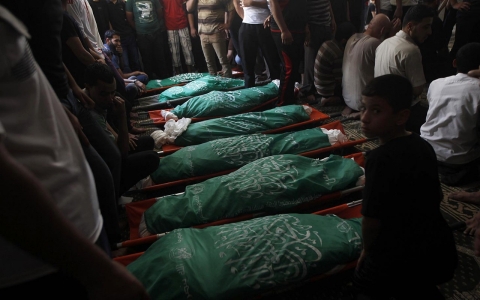
More than 100 Palestinians have been killed since Israel launched its 'Operation Protective Edge'
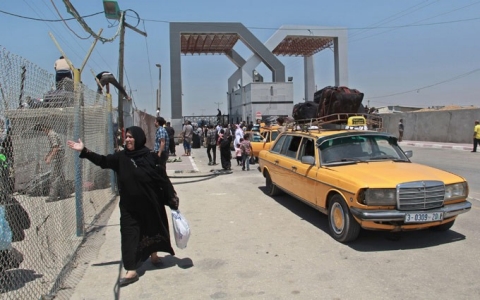
Palestinians try to escape Israeli shelling, but exit is limited to the severely wounded and Egyptian passport holders.
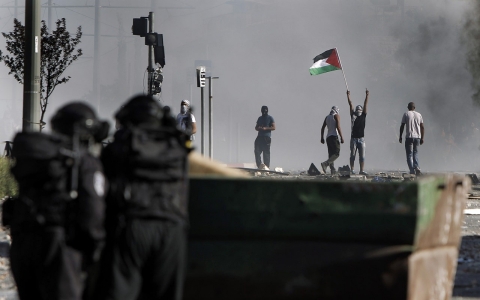
Al Jazeera asks regional experts to weigh in on how a ceasefire can be implemented and peace efforts renewed.
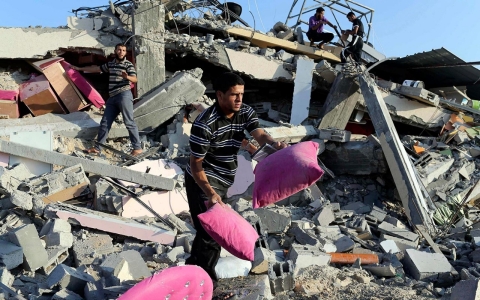
Gaza residents testify about the effects Israel and Egypt's blockade have had on their lives.
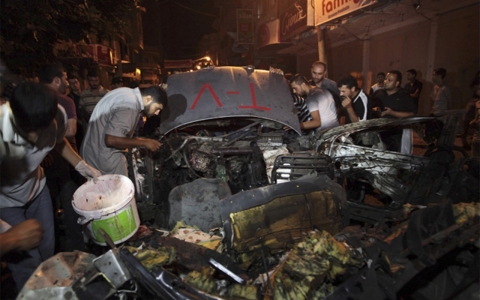
The death of Hamed Shehab on Wednesday in an Israeli air strike has triggered fear and anger among journalists in Gaza






Error
Sorry, your comment was not saved due to a technical problem. Please try again later or using a different browser.